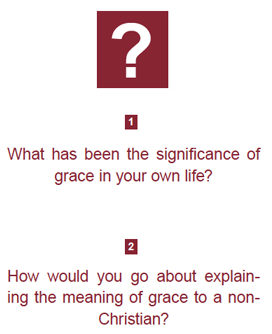Back to series


Recommended Reading:

Amazing Grace: How Complex the Sound!
Click here to open a Print - Friendly PDF
 There’s a story told about C.S. Lewis attending a conference on comparative religions. Several people were debating what was unique about Christianity. After numerous suggestions were rejected, Lewis interjected. “What’s unique about Christianity? Oh, that’s easy. It’s grace.”
There’s a story told about C.S. Lewis attending a conference on comparative religions. Several people were debating what was unique about Christianity. After numerous suggestions were rejected, Lewis interjected. “What’s unique about Christianity? Oh, that’s easy. It’s grace.”
Whether the story is historically accurate or not does not negate the truth that grace distinguishes the gospel from other faiths. God’s free gift of salvation, based on Jesus’s atoning sacrifice on the cross, stands out as unparalleled in the world of religions.
This is worth deep reflection and appreciation. It also poses a challenge in communicating this rare concept to outsiders. In this article, I hope to examine the reality of the grace of the gospel and offer suggestions for communicating it to people who may not know what we’re talking about.
Understanding Grace
Here’s another way we can think about grace: Some religions can be spelled “D-O. Do this, do that.” Other religions can be spelled “D-O-N’-T. Don’t do this. Don’t do that.” Christianity can be spelled “D-O-N-E. It’s all be done for you. Now receive it.”
If you want to dig further, you can explore the differences between the indicative and the imperative statements in the Bible. The indicatives “indicate” things that are true. The imperatives give us commands to obey. In other religions, the imperatives come before the indicatives. In the gospel, the imperatives come after the indicatives.
(I’ve been told that, technically speaking, there are a few rare Buddhist sects that have a kind of grace-based enlightenment. Their faiths are not based on what you do. They are based on grace. Fair enough. If you find yourself witnessing to a follower of one of these obscure Buddhist sects, you’ll need different tactics than my suggestions here.)
So grace is the distinguishing mark of the gospel and a crucial concept to communicate as we proclaim the Good News. But this is no easy task. The notion of free grace is counter-intuitive, counter-cultural, and counter-everything our society is based on. We write résumés to tell people what we’ve done so we can get hired. We list accomplishments on applications so we can be accepted to a school or club or society. We do! That’s how our world works.
 Sometimes we can simply quote Ephesians 2:8–9 and show people that the New Testament emphasizes the contrast between grace and works. Paul wrote, “For it is by grace you have been saved, though faith — and this not from yourselves, it is the gift of God — not by works, so that no one can boast.”2 We can then quote verse 10 and show how works come after grace. “For we are God’s workmanship, created in Christ Jesus to do good works, which God prepared in advance for us to do.”
Sometimes we can simply quote Ephesians 2:8–9 and show people that the New Testament emphasizes the contrast between grace and works. Paul wrote, “For it is by grace you have been saved, though faith — and this not from yourselves, it is the gift of God — not by works, so that no one can boast.”2 We can then quote verse 10 and show how works come after grace. “For we are God’s workmanship, created in Christ Jesus to do good works, which God prepared in advance for us to do.”
We might offer the catchy slogan, “Grace alone saves but the grace that saves is never alone.”3 Or we can write out two contrasting equations to distinguish grace-based salvation from the works-based varieties:
Grace + Works = Salvation
Grace + nothing = Salvation + works.
Note: In the second equation, the way the New Testament speaks about grace, the word works is written on the right side of the equals sign.
I’ve presented this equation many times and have seen the lightbulb go on for many nonbelievers. But not always. And I think I have an idea why this may be the case. The word grace can legitimately be used in different ways in different situations. We say “grace” before meals. A dancer moves with “grace.” Some speakers express themselves with “grace.” Dictonary.com lists as many as twenty-two distinct definitions for the word grace.
 Please don’t get me wrong. I’m not promoting some bizarre postmodern notion that words can mean anything or that definitions are determined by hearers totally apart from the intent of the speaker. (It always seems odd to me that people who want to argue for this idea use words to express themselves. And they expect you to understand them. They might even get mad at you for not interpreting their words correctly!)
Please don’t get me wrong. I’m not promoting some bizarre postmodern notion that words can mean anything or that definitions are determined by hearers totally apart from the intent of the speaker. (It always seems odd to me that people who want to argue for this idea use words to express themselves. And they expect you to understand them. They might even get mad at you for not interpreting their words correctly!)
I am saying that some words have a range of meaning that vary, based on context. I love my wife. I also love Edwardo’s deep dish elephant garlic pizza. But if I mean the exact same thing by both uses of the word love, I doubt my wife will feel romantically wooed. If I go bowling and knock down ten pins in a single frame but take two rolls to do so, it will be scored as a spare. But the word spare means something rather different if I say I have a spare tire around my waist (probably from eating too much Edwardo’s deep dish elephant garlic pizza).
Exploring Grace
Consider some ways the word grace is used in the Bible. In the Old Testament, the term can refer to a positive quality of an individual, as in Psalm 45:2, where the king is praised, “You are the most excellent of men and your lips have been anointed with grace.” Proverbs uses the term several times, describing a positive effect from receiving God’s many statements of wisdom, for example, “They will be a garland to grace your head” (1:9). And Zechariah says that God will “pour out on the house of David and the inhabitants of Jerusalem a spirit of grace and supplication” (12:10).
In the New Testament, the pattern continues. Jesus’s early days are described as his being “filled with wisdom, and the grace of God was upon him” (Luke 2:40). John describes Jesus similarly as “the One and Only, who came from the Father, full of grace and truth” (John 1:14). These uses of the word do not express the specific doctrine of “saving grace” but they do point forward to it.
We might be helped by remembering the categories of God’s common grace and His saving grace. Common grace refers to those general blessings of God upon all people. Thus Jesus said, “[God] causes his sun to rise on the evil and the good, and sends rain on the righteous and the unrighteous” (Matt. 5:45). There may be gifts of God’s grace that apply to specific individuals but that grace is still not the same as saving grace. For example, Stephen, a mere man, was said to be “a man full of God’s grace and power” (Acts 6:8).
 But the topic of grace reaches its apex as God’s unique saving grace through the Messiah. The majority of references to grace in the New Testament are by Paul and elaborate on the grace of the gospel. One of Paul’s fullest expressions of this saving grace is in Romans 3:21–24:
But the topic of grace reaches its apex as God’s unique saving grace through the Messiah. The majority of references to grace in the New Testament are by Paul and elaborate on the grace of the gospel. One of Paul’s fullest expressions of this saving grace is in Romans 3:21–24:
But now a righteousness from God, apart from law, has been made known, to which the Law and the Prophets testify. This righteousness from God comes through faith in Jesus Christ to all who believe. There is no difference, for all have sinned and fall short of the glory of God, and are justified freely by his grace through the redemption that came by Christ Jesus.
One helpful distinction can be seen when grace is referred to as “the grace of our Lord Jesus Christ.” This is certainly not saying that Jesus was a gracious person when He was here on earth (although He most definitely was). Or that He did some nice things that could be described as grace (such as feeding 5,000 hungry people or healing people of diseases that had crippled them for many years). “The grace of the Lord Jesus Christ” is used to refer to the gift of salvation based on Jesus’s unique, sin-pardoning, wrath-satisfying, salvation-purchasing, once-for-all-atoning death on the cross and His resurrection that followed. It’s gospel-grace unlike any and every other kind of grace.
Communicating Grace
 So when we’re talking with nonbelievers, we shouldn’t be surprised (or annoyed or impatient or unkind) if they don’t understand what we mean when we first use the word grace. Here are a few ways we might express ourselves more clearly:
So when we’re talking with nonbelievers, we shouldn’t be surprised (or annoyed or impatient or unkind) if they don’t understand what we mean when we first use the word grace. Here are a few ways we might express ourselves more clearly:
“I just used the word grace. I probably could better explain what I mean by that. People use that word in a lot of different ways. When I said grace, I meant a very specific kind of grace, the kind that means getting something we don’t deserve. We get forgiveness we don’t deserve because Jesus paid for sins He didn’t commit.”
Or, “When I say grace, do you know what I mean? It can mean several different things. But I’m talking here about a very specific kind of grace—a grace that saves us from punishment for sin. Does that make sense to you?”
Or, “Grace is a tricky word, because it can be used in different ways. I’m talking here about grace as an exchange. We don’t deserve God’s goodness because of our sin. Jesus didn’t deserve punishment for sin because He’s sinless. Grace exchanges our sin for His payment. We get His forgiveness because He got our punishment.”
This may seem difficult. But I have heard many stories of people “getting it” when they hear just how amazing grace is. I wonder if we might see more people respond when we quote the first verse of John Newton’s great hymn:
Amazing grace, how sweet the sound that saved a wretch like me. I once was lost. But now I’m found; was blind but now I see.
|
Notes: |

Randy Newman
Senior Fellow for Apologetics and Evangelism, CSLIRandy Newman (1956-2024) was the Senior Fellow for Apologetics and Evangelism at the C.S. Lewis Institute. He taught at several evangelical seminaries. After serving for over 30 years with Campus Crusade for Christ, he established Connection Points, a ministry to help Christians engage people’s hearts the way Jesus did. He has written seven books, Questioning Evangelism, Corner Conversations, Bringing the Gospel Home, Engaging with Jewish People, Unlikely Converts: Improbable Stories of Faith and What They Teach Us About Evangelism, Mere Evangelism. and his most recent, Questioning Faith: Indirect Journeys of Belief through Terrains of Doubt. Randy has also written numerous articles about evangelism and other ways our lives intertwine with God’s creation. He earned his MDiv and PhD in Intercultural Studies from Trinity International University. Randy went home to be with the Lord in May 2024.

Recommended Reading:
Philip Graham Ryken, Grace Transforming (Crossway, 2012)
This book is based on a series of chapel messages given by Phil Ryken during his first year as president of Wheaton College, and adapted for a wider audience. For those of us who are performance-oriented or for those who have long since thrown in the towel, a word about grace is in order. Within these pages are 9 key messages on the grace of God. These are masterful lessons, built on Scripture, edifying and applicable for all who want to experience the freedom that comes from resting on the promise of God’s unmerited favor. Helping us to understand that we are not defined by what we do — but rather by who Jesus is and what he has done, this book powerfully addresses the transforming power of grace that is essential for every Christian.
 COPYRIGHT: This publication is published by C.S. Lewis Institute; 8001 Braddock Road, Suite 301; Springfield, VA 22151. Portions of the publication may be reproduced for noncommercial, local church or ministry use without prior permission. Electronic copies of the PDF files may be duplicated and transmitted via e-mail for personal and church use. Articles may not be modified without prior written permission of the Institute. For questions, contact the Institute: 703.914.5602 or email us.
COPYRIGHT: This publication is published by C.S. Lewis Institute; 8001 Braddock Road, Suite 301; Springfield, VA 22151. Portions of the publication may be reproduced for noncommercial, local church or ministry use without prior permission. Electronic copies of the PDF files may be duplicated and transmitted via e-mail for personal and church use. Articles may not be modified without prior written permission of the Institute. For questions, contact the Institute: 703.914.5602 or email us.
-
Recent Podcasts
Hyper-Realist Finds Faith – Spencer Durrenberger’s Story
by Spencer Durrenberger on December 20, 2024Former atheist Spencer Durrenberger grew up in an...Read More
-
First Steps to Loving and Understanding Our Jewish Neighbors
by Aimee Riegert, Randy Newman on December 13, 2024
-
Reasons for God – Dr. Kathleen Noller’s Story
by Jana Harmon, Kathleen Noller on December 6, 2024
-
Recent Publications
How Artists and Their Art Can Point Us to the Creator
by Russ Ramsey on December 2, 2024"... if you say that you want to...Read More
-
What about Jesus’s Childhood?
by Jim Phillips on December 1, 2024
-
Will You Be Ready?
by Thomas A. Tarrants on October 23, 2024
0
All Booked
0.00
All Booked
0.00
All Booked
23903
Fellows Program – Applications Available on February 1st!
https://www.cslewisinstitute.org/?event=fellows-program-applications-available-on-february-1st&event_date=2025-02-01®=1
https://www.paypal.com/cgi-bin/webscr
2025-02-01

Next coming event
Days
Hours
Minutes
Seconds
Fellows Program – Applications Available on February 1st!
On February 1, 2025 at 7:00 amTags
Speakers

Randy Newman
Senior Fellow for Apologetics and Evangelism, CSLI
Team Members

Randy Newman
Senior Fellow for Apologetics and Evangelism, CSLIRandy Newman (1956-2024) was the Senior Fellow for Apologetics and Evangelism at the C.S. Lewis Institute. He taught at several evangelical seminaries. After serving for over 30 years with Campus Crusade for Christ, he established Connection Points, a ministry to help Christians engage people’s hearts the way Jesus did. He has written seven books, Questioning Evangelism, Corner Conversations, Bringing the Gospel Home, Engaging with Jewish People, Unlikely Converts: Improbable Stories of Faith and What They Teach Us About Evangelism, Mere Evangelism. and his most recent, Questioning Faith: Indirect Journeys of Belief through Terrains of Doubt. Randy has also written numerous articles about evangelism and other ways our lives intertwine with God’s creation. He earned his MDiv and PhD in Intercultural Studies from Trinity International University. Randy went home to be with the Lord in May 2024.






